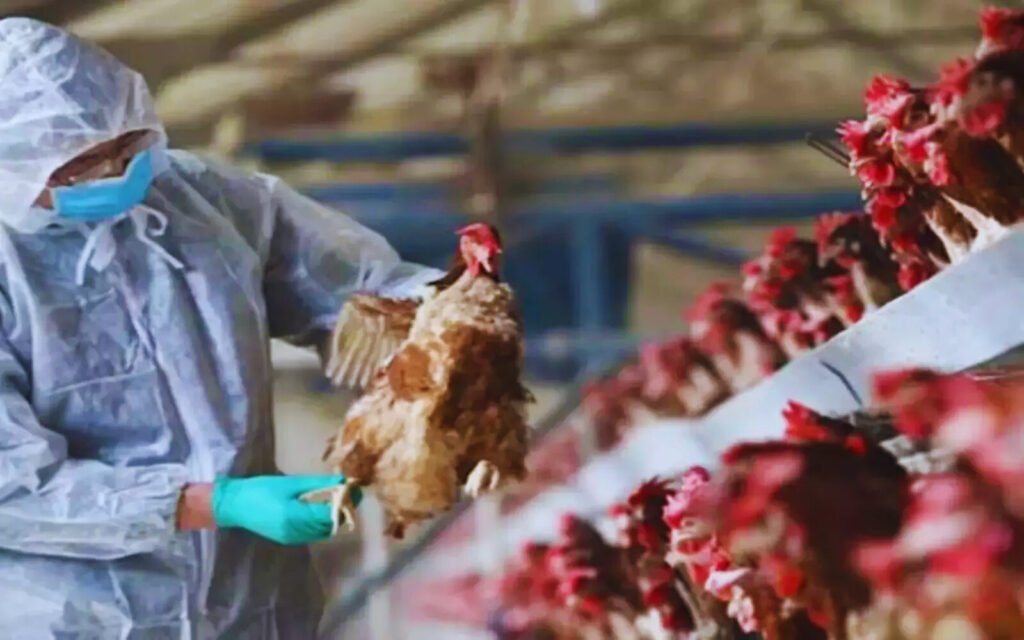Bird Flu (Avian Influenza)
Often referred to as “bird flu,” avian influenza is a virus that mainly impacts birds but can also infect cows, other animals, and occasionally people. The most frequent influenza A subtypes in humans are the H5 types, which can cause symptoms ranging from minor breathing issues to serious complications. The greatest risk of infection is for those who handle dairy cows, ducks, and poultry.

Table of Contents
Overview
One kind of influenza causes bird flu, sometimes known as avian influenza. a virus that mainly infects birds and other animals. Humans are occasionally infected by the virus, which can cause serious sickness. Despite the rarity of human-to-human transmission, there is still concern about the virus’s potential to change so that it spreads more readily between individuals.
Bird or animal epidemics make the disease even more concerning since they can impact wildlife, raise the risk of human infection, and disrupt the food chain. Since 2024, the H5 variant of influenza A has been implicated with recent cases in the United States.
Symptoms and Causes
Symptoms of Bird Flu
Symptoms can range from mild to severe and include:
- Respiratory Issues: Cough, sore throat, runny or stuffy nose, shortness of breath.
- General Illness: Fever, fatigue, muscle aches, nausea, and vomiting.
- Digestive Symptoms: Diarrhea.
- Other Signs: Pink eye (conjunctivitis).
Complications from severe cases might include infection, influenza, acute respiratory distress, and the illness, or swelling of the brain.
Causes and Transmission
Influenza A viruses, specifically H5N1 in humans, are the cause of bird flu. The virus may spread to other areas of the body after infecting the lungs and upper respiratory tract. Contact with an infected animal’s fluids—such as saliva, drops of breath, milk, or feces—causes transmission.
Eggs, pasteurised milk, and properly prepared chicken cannot infect humans with bird flu. However, the risk is increased when handling diseased animals or their droppings.
For more updates on our Website.
Diagnosis and Teststed
Medical professionals use samples from the throat, nose, or eyes to diagnose avian flu. Additional testing at specialised labs to establish the outbreak of avian flu may be necessary if an influenza A test is positive. It’s critical to let your doctor know if you’ve come into touch with any animals that might be infected.
Management and Treatment
Antiviral drugs can lessen the impact of the sickness if used early. Antivirals that are frequently recommended include:
- Oseltamivir (Tamiflu®)
- Peramivir (Rapivab®)
- Zanamivir (Relenza®)
In severe circumstances, hospitalisation could be necessary for treating and tracking effects.

Prevention
To reduce the risk of bird flu:
- When working with wild animals, livestock, or birds, put on protective gear such as goggles, gloves, and masks.
- Hands should be washed often, especially after being near animals or birds.
- Keep clear of working with sick or avian influenza-exposed animals.
- To avoid contamination, take off your shoes before entering your house.
- Steer clear of raw eggs and unpasteurised milk.
- To reduce the chance of contracting both seasonal influenza and avian flu, be vaccinated against seasonal flu.
To stop or lessen epidemics, public health organisations such as the CDC keep an eye on avian flu cases and produce vaccines.
Outlook/Prognosis
While severe cases require hospitalisation, the majority of human cases of avian flu are mild. About half of known cases of avian flu turn out to be fatal, making the overall fatality rate historically high. Recent cases in the United States, however, have been milder.
If you suspect contact or suffer from severe symptoms like confusion, temperature exceeding 103°F (40°C), or trouble breathing, get immediate help.
Conclusion
The food supply and public health are seriously threatened by bird flu. Those who work with animals must take extra care to lower risks, even if human cases are rare. If you are worried about bird flu exposure or symptoms, be informed and speak with a healthcare professional.
Is bird flu a current problem?
Indeed, bird flu continues to pose a threat to both human and animal health, especially when outbreaks affect both birds and humans.
Can a pandemic be caused by avian flu?
Although rare, a mutation that makes it easier for avian flu to spread from person to person could cause a pandemic.
How do cattle get bird flu?
Similar to people, cattle can get bird flu by breathing in the virus or coming into close contact with bodily fluids from sick animals.
